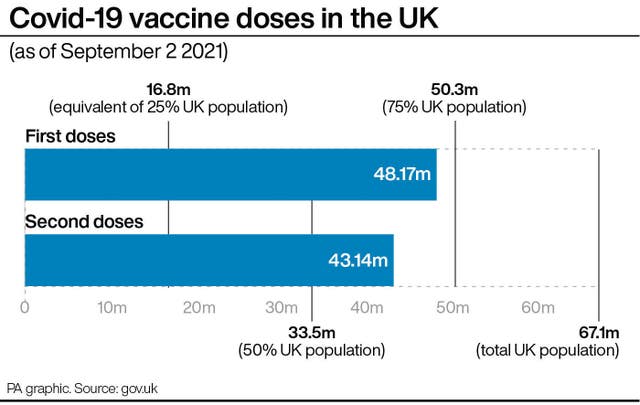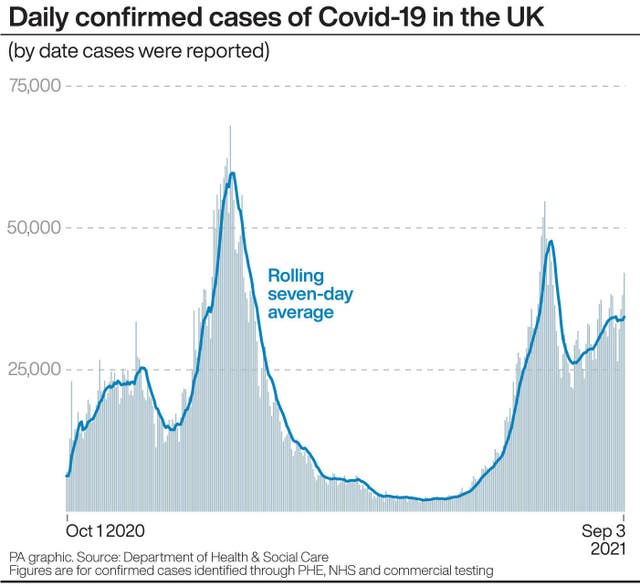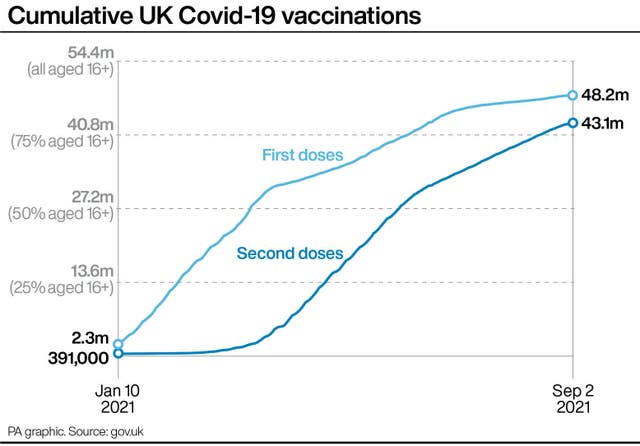Covid jabs for healthy children aged 12-15 likely to get ministerial backing
The four chief medical officers of the UK are being asked to review the wider benefits of vaccination for the age group.

Ministers look likely to approve the vaccination of healthy 12 to 15-year-olds against coronavirus after asking the UK’s chief medical officers to review the evidence for a mass rollout.
The Joint Committee on Vaccination and Immunisation (JCVI) decided against backing the move on health grounds alone because Covid-19 presents such a low risk to younger teenagers.
But Professor Chris Whitty and the three other chief medical officers in the UK are reviewing the wider benefits of vaccinating the age group, such as minimising school absences, and are expected to present their findings within days.
The Government is awaiting their advice before making a final decision but ministers have indicated they are keen on authorising a wider rollout.
Scientific Advisory Group for Emergencies (Sage) member Professor John Edmunds warned there could be “a lot of disruption” to education without a wider rollout as he estimated around six million children have not contracted coronavirus.
“It’s a very difficult one, They’re going to take a wider perspective than the JCVI took, I think that’s right,” he told BBC Radio 4’s Today programme.
“I think we have to take into consideration the wider effect Covid might have on children and their education and developmental achievements.
“In the UK now it’s difficult to say how many children haven’t been infected but it’s probably about half of them, that’s about six million children, so that’s a long way to go if we allow infection just to run through the population, that’s a lot of children who will be infected and that will be a lot of disruption to schools in the coming months.”

Professor Wei Shen Lim, the JCVI’s chairman of Covid-19 immunisation, said the group’s view was that the benefits of vaccinating the age group “are marginally greater than the potential harms” but that the benefits were “too small” to support a universal rollout at this stage.
But multiple newspapers reported Government insiders playing up the likelihood of a subsequent approval of the programme, with a Government source telling the BBC: “We believe there is strong case to vaccinate but await the advice of the chief medical officers.”
On Friday, the JCVI approved a widening of the vaccination programme another 200,000 children aged between 12 and 15 who have underlying health conditions.
But they stopped short of recommending the full rollout after investigating potential side effects, such as the extremely rare events of inflammation of the heart muscle, known as myocarditis, after Pfizer or Moderna vaccinations.
While the condition can result in short periods of hospital observation, followed by typically swift recoveries, the JCVI concluded the medium to long-term outcomes are still uncertain and more follow-up time is needed to get a clearer picture.

Former chief scientific adviser Professor Sir Mark Walport said it was right to consider the wider benefits of vaccinating children as he suggested the potential for side effects could be outweighed by the benefits.
He said children’s health “is also affected by their social environment, by their ability to go to school, by what happens in the family and so there are broader factors as well”.
“All the evidence is the rate of myocarditis, the inflammation of the heart muscle, and of pericarditis, is at least the same and probably significantly higher in that same population group if they get coronavirus,” he told Today.
Health Secretary Sajid Javid wrote to the UK’s four chief medical officers asking them to carry out a fresh review of the evidence, looking at the “matter from a broader perspective”.
The decision came a week after the Department of Health and Social Care confirmed preparations were under way to ensure the NHS was ready to offer coronavirus jabs to all 12 to 15-year-olds in England from early September.

The department had said it wanted to be “ready to hit the ground running”.
Ministers have been indicating they favoured the universal programme and had been pressing the JCVI for a quick decision.
On Thursday, Education Secretary Gavin Williamson said he felt parents would find it “deeply reassuring” to have a choice of whether their children should have a jab or not, adding that many people hoped they would be in a position “of being able to roll out vaccinations for those who are under the age of 16”.
The Government has said if all 12 to 15-year-olds were to be offered a vaccine, parental or carer consent will be sought, as in other school immunisation programmes.
Geoff Barton, general secretary of the Association of School and College Leaders (ASCL), said he was disappointed by the JCVI decision not to recommend jabs for all in the age group.
He added that while the union respects it, it could mean it is “more difficult during the autumn term and beyond to guard against educational disruption caused by transmission of the virus”.





